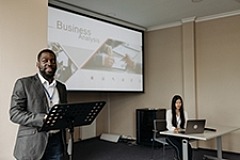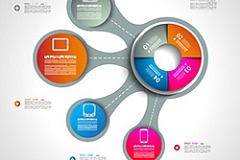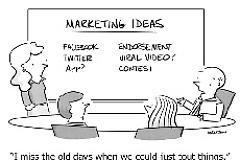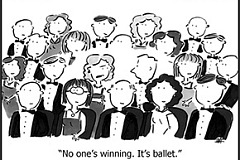Creating a powerful and engaging presentation that makes a lasting impression isn’t a skill that comes naturally to most of us.
You may have great ideas, but if you don't present them in an entertaining way, you'll quickly lose your audience. Giving a winning presentation takes more than standing in front of an audience while you read PowerPoint slides to the crowd.
Without passion and preparation, your words will fall flat. With a little forethought, you can engage your audience and drive your message home.
If you're looking for ways to make your business presentation stronger, we have some ideas! Here are nine tips to help you captivate your audience and bring your presentation to life.
1. Understand Your Audience
Think of your presentation as a gift to your audience. You wouldn't give the same gift to your friend as you would to your nephew. They're different people and care about different things, just like your audience.
Think about why you are presenting, who asked you to speak, and who will attend. Is your audience familiar with the topic or will it be a new concept for them?
All of these elements come into play as you plan a presentation. Nothing will put your audience to sleep faster than a boring presentation on a subject they already know.
A good rule of thumb is to build an audience "persona." Know whether the audience will be of similar backgrounds and occupations or if they will be a diverse group.
Plan your words, visuals, jokes, and overall direction to suit your audience. They'll appreciate it and reward you with their attention as you speak.
2. It's Not About You
Many people avoid public speaking like the plague. They may have a huge fear of speaking before a group. This usually stems from a fear of public humiliation.
One way to calm those public speaking worries is to remember it's the point that matters, not how perfect you are as a speaker.
Focusing on the content and delivery of your message will do more to calm your nerves than anything else. The best way to ensure people will listen to your message is to prepare.
Shifting your focus from your nerves to your message helps you focus on the task at hand. This can make you less anxious and more likely to deliver a solid presentation.
3. Know Your Stuff
Getting in front of a crowd and faking your knowledge and excitement about a particular topic is sure to backfire. People can spot a fake a mile away.
Know your material. You must have a point to be able to convey it. Don't make your topic too broad or your theme too deep to understand.
Narrow your focus and be specific in your messaging. Ask yourself these four questions:
- What ideas do I want to convey?
- How can I make the idea successfully?
- What will be the result of that success?
- What will my audience learn from that success?
The answer is in your presentation. Have confidence in what you're saying and do your research. The more you know, the more it will show.
Consulting a business coach is a great first step. Our advisors and sales trainers are highly skilled in executive coaching. We can help you connect with your audience and become a more capable, confident, and convincing speaker.
4. Project and Pause
Many people start talking fast when they're nervous. This can cause you to run out of breath and get even more nervous during a presentation.
Your audience will pick up on your nervousness, and it can distract them from your message. If this happens to you when you speak in front of a crowd, you can correct it.
Try to slow down as you speak. Project your voice at times but don't shout at your audience.
Pause in between phrases and sentences. Doing these things helps emphasize your points and keeps your message conversational.
When you feel yourself speeding up, take a breath and slow down. In time, you'll get into the habit of speaking at a natural pace and feeling more comfortable and confident before a crowd.
5. Be Yourself
There's no perfect formula for a perfect presentation. There's no right gesture or certain joke to tell. It all comes down to authenticity.
Audiences respond to an authentic speaker. They relate to someone who makes a connection to them.
You don't have to be the world's best speaker to engage your audience and make your point. If they pick up on your sincerity, they are more inclined to like you and believe what you have to say.
On the other hand, they can spot insincerity quickly. This can break your connection, reduce engagement, and harm your reputation.
Don't be afraid to show them who you really are. Tell a story, make them laugh, or share a favorite quote. Your best bet is to be yourself and try to forge a relationship with your audience.
6. Use Notes to Support You
Have you sat through a meeting or speech where the presenter read their notes aloud without engaging with the audience? If so, you know how boring that can be!
The audience is there to listen to you, learn from you, and take something valuable away from your presentation. Do not bore them to tears by reading from a PowerPoint slide or note cards.
Having notes is fine. But you must engage your audience first. Think of your notes as a shopping list or shorthand reminders of what to cover in a certain order.
Refer to them from time to time as you speak but do not use them as a script. Your audience wants to hear from you, see your face, and connect with you in an authentic way.
7. Exude Confidence
The way you carry yourself during a presentation speaks volumes. When your body language demonstrates confidence, your mind will follow.
Keep your head up and stand up straight. When you carry yourself with confidence, you're reassuring your audience of your authority on the subject matter.
Don't be too serious. If you are stiff and stern, your message will be lost. Throw in some humor, laugh at yourself a bit, and show your human side to your audience.
Use forceful words and project your voice when needed. Speak softly when it's appropriate to do so.
Have a strong opening and an interesting or funny anecdote. Speak clearly and slowly. End on a positive, profound, or thought-provoking note.
8. Handle Difficult Questions
If you're presenting before a crowd about work-related issues, you should expect some comments and questions. Remain calm even if others are not.
If you get a question that stumps you, it's okay to say you don't know. People understand you are human.
Being authentic with your audience can actually increase your credibility, even if you don't know the answer to a question. Let them know you will ask, look it up, and get back to them.
No matter how professional or knowledgeable you may be, you will never have all the answers. No one expects you to be all-knowing, so just be honest and do your best.
9. Add Some Dramatic Flair
Consider the best speakers you have watched in the past. They were probably storytellers.
People remember the speakers who entertain, enlighten and demonstrate compassion. They don't remember the dull speaker who read their presentation from a computer screen.
Excellent speakers use a bit of dramatic flair to keep their audience engaged. You may think you don't possess these skills. But with a little consulting or business coaching, you can liven up your presentations to better share your message.
As you plan your message, consider the point you want to make. How do you want the audience to feel? What do you want them to do as a result of your presentation?
Consider the answers as you plan a presentation to engage and inspire the crowd.
Amp Up Your Business Presentation
Whether you give a business presentation once a week or once in a while, there are many things you can do to boost your speaking skills. You don't have to be a professional speaker to engage your audience and drive your message home.
Although public speaking is a common fear, these tips can help you conquer insecurities, improve speaking skills, and captivate audiences. If you're interested in investing in business coaching, we can help!
We are passionate about helping our clients succeed. We'll work with you to help you feel more confident and develop the skills you need to succeed in your industry.














